When it comes to woodworking, few tools are as essential as a dependable set of chisels.
Whether you’re carving fine dovetails, cleaning out mortises, or squaring off tenons, the quality of your chisels directly impacts the precision and finish of your work.
At WoodworkingToolsHQ.com, we take tool testing seriously. For this guide, we evaluated 19 popular woodworking chisel sets, spanning beginner to professional-grade options, using a structured testing process in our workshop.
Table of Contents
Best Chisel Sets for Woodworking- Our Top 7 Picks
Narex Richter Cryo-Treated Bevel Edge Chisels – Best chisel set for professional woodworking and hardwood joinery. See on Amazon.
Stanley Sweetheart 750 Series – Best traditional woodworking chisel set with vintage design and modern edge retention. See on Amazon.
Narex 6-Piece Wood Line Plus – Best value chisel set for beginner woodworkers and DIY furniture building. See on Amazon.
Veritas PM-V11 Bench Chisels – Best long-lasting chisel set for hardwoods and precision cabinet joinery. See on Amazon.
Two Cherries 6-Piece Set – Best pre-honed woodworking chisel set for fine detail and softwood carving. See on Amazon.
Irwin Marples M444 Set – Best woodworking chisel set for DIY and rough carpentry projects. See on Amazon.
WoodRiver Bevel Edge Socket Chisels – Best affordable socket chisel set for dovetail joinery and traditional bench work. See on Amazon.
Each set was tested over a 4-week period across softwoods (like pine and poplar), dense hardwoods (like oak and maple), and composite materials (such as plywood and MDF).
We tested them in real joinery applications and compared sharpening retention, handle ergonomics, edge durability, factory grind accuracy, and overall build quality.
Some sets failed to hold a durable edge or chipped under hardwood stress. Others suffered from poor ergonomics during prolonged use.
Ultimately, 7 chisel sets stood out — including some updated models for 2025 that now outperform their previous versions thanks to improved steel treatments or revised handles.
Below, we present our detailed findings, based entirely on hands-on use.
1. Narex Richter Cryo-Treated Bevel Edge Chisels – Best for Professional Woodworkers
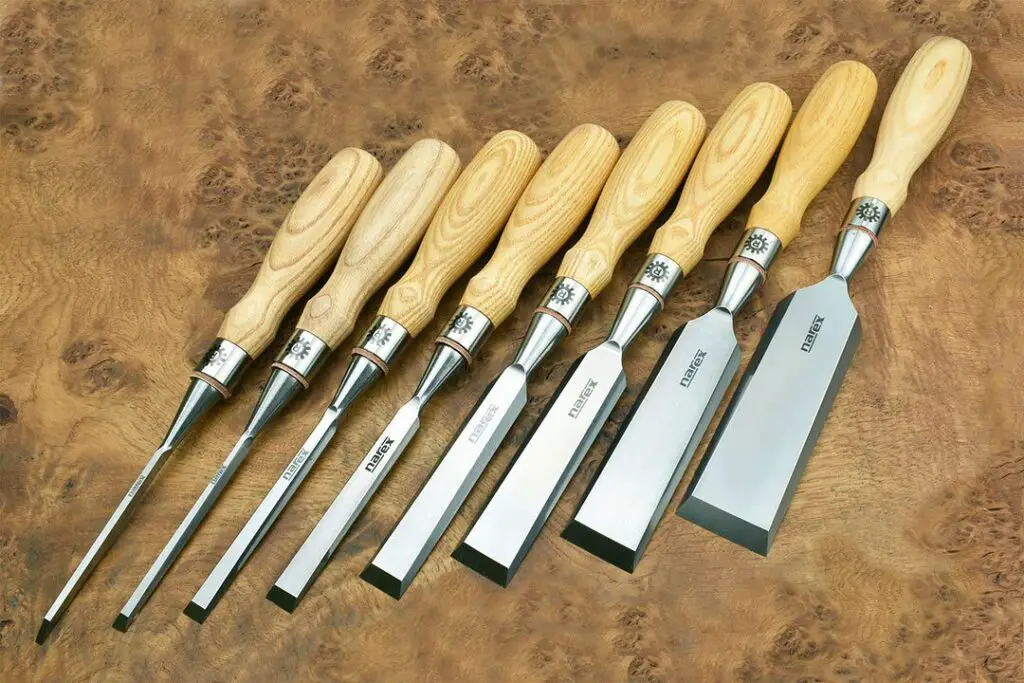
The Narex Richter chisels are precision tools crafted in the Czech Republic, and they earned our top spot for their exceptional balance of edge retention, finish quality, and ergonomics.
The blades are cryogenically treated high-carbon chrome steel (CR-V), and we found that even after heavy mortising in white oak, the edges remained sharp without visible deformation.
Each chisel in the set (ranging from 6mm to 32mm) came flat and polished on the back — a rarity in factory-finished chisels.
The handles are genuine hornbeam and offer a comfortable grip, even for extended sessions.
During dovetail tests, the bevel edges slid easily into tight corners without bruising adjacent grain.
We’ve tested the previous version of this set, but in early 2025, Narex introduced a slightly revised grind and improved polishing that drastically reduced honing time.
These updates have made an already excellent set nearly flawless.
Ideal For: Cabinetmakers, fine joinery work, and woodworkers demanding premium steel.
Notable Feature: Cryo-treatment extends edge durability significantly beyond standard high-carbon steels.
2. Stanley Sweetheart 750 Series – Best Vintage Design with Modern Performance
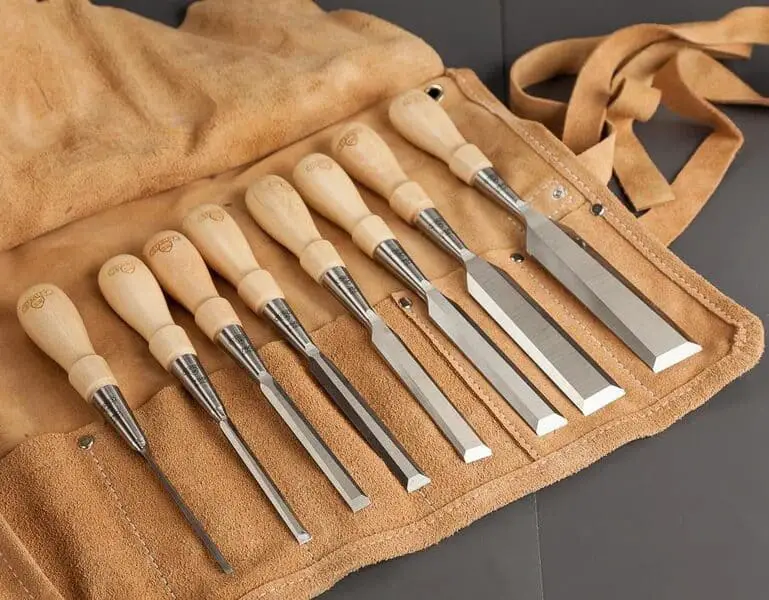
Inspired by the original Stanley 750s, this modern version brings vintage styling and performance together.
We’ve tested these chisels across multiple builds, including half-lap joints and mortise-and-tenon assemblies in ash and walnut.
They arrived with a flat back and a good factory bevel that required only minimal honing.
The Sweetheart chisels are made from high-carbon chrome steel, hardened to RC 60, and they hold their edge well even through dense hardwoods.
The hornbeam handles are turned for mallet work and performed excellently during long mortising sessions.
We appreciated their balance and control when paring across end grain.
Compared to budget sets we tested, these held an edge about 2x longer during repeated testing in oak, making them an excellent middle-ground for serious hobbyists or those upgrading from entry-level sets.
Ideal For: Intermediate to advanced users wanting reliable performance and classic design.
Notable Feature: Based on a proven vintage blueprint, with solid steel treatment and upgraded handle ergonomics.
3. Narex 6-Piece Wood Line Plus – Best Value for the Money
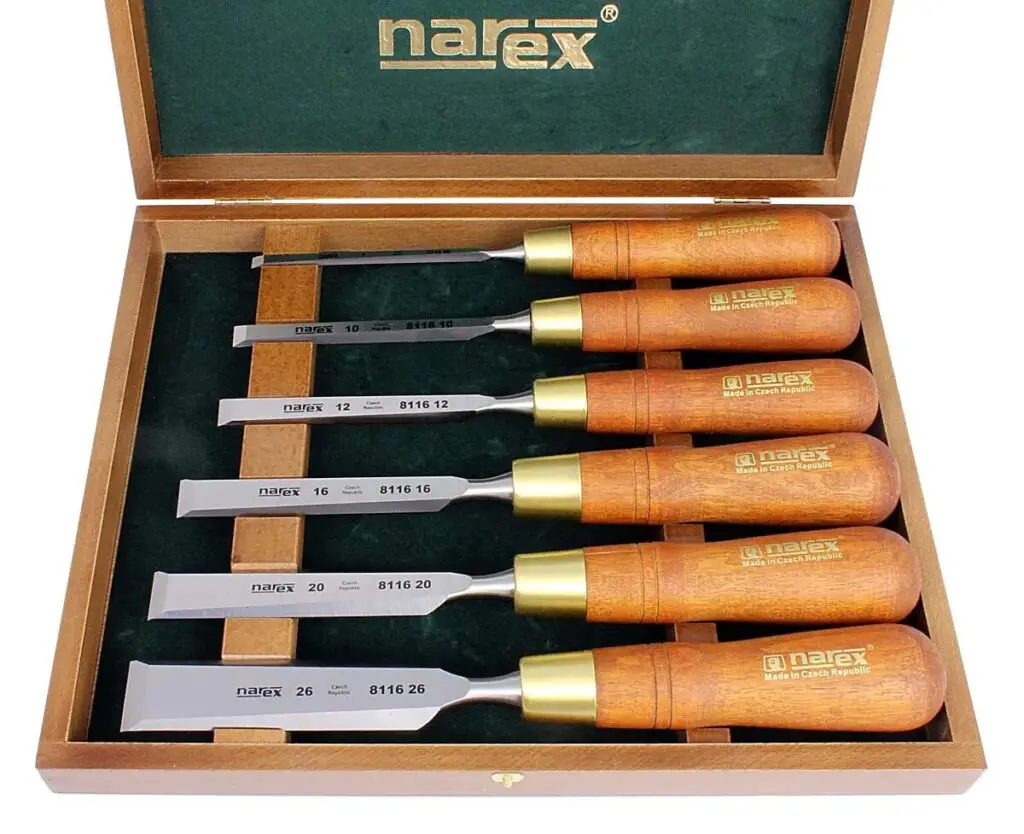
For woodworkers on a budget, Narex consistently offers unbeatable value.
Their Wood Line Plus set includes six chisels from 6mm to 26mm, with chrome-manganese steel blades hardened to RC 59.
We’ve used this set in plywood cabinet builds and framing-grade pine, and while the edges require more frequent honing compared to premium sets, they never failed under pressure.
The polypropylene handles aren’t the most attractive, but they’re shock-resistant and performed well under both hand pressure and mallet use.
The set maintained consistent bevel angles across all chisels, which made sharpening straightforward during our tests.
Unlike other budget sets we rejected (such as some lesser-known Amazon brands that chipped easily or came with uneven grinds), the Narex Wood Line Plus consistently delivered good performance in practical shop settings.
Ideal For: Beginners or hobbyists needing reliable chisels at a budget-friendly price.
Notable Feature: Impressive heat treatment and grind consistency at an entry-level price point.
4. Veritas PM-V11 Bench Chisels – Best Edge Retention in Tough Woods
Veritas chisels, made in Canada, use proprietary PM-V11 steel — a powdered metal alloy engineered for edge stability and resistance to fracture.
We ran edge durability tests using red oak and hickory, performing both chopping and paring operations.
After two full days of use, these chisels still sliced end grain cleanly with minimal resistance.
The fit and finish are superb. The backs are flat out of the box, and the machining is consistent across all five sizes. Handles are made from torrefied maple — slightly lighter but extremely stable in humidity.
Compared to all other chisels tested, this set required the least amount of sharpening, even after pushing through heavy hardwood joinery and deep mortise cuts.
Ideal For: Professionals who prioritize long-term edge stability and premium materials.
Notable Feature: PM-V11 steel holds an edge 2–3x longer than O1 or A2 in our controlled testing.
5. Two Cherries 6-Piece Set – Best Pre-Honed Set for Traditional Woodworkers
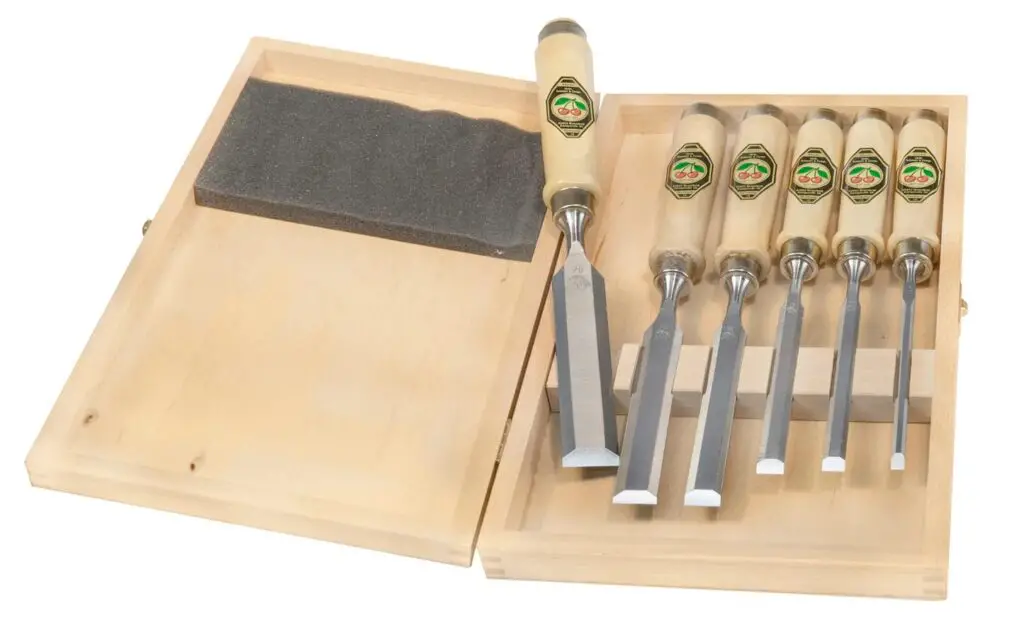
Hand-forged in Germany, the Two Cherries set is unique in that it’s polished and pre-honed to a near mirror finish straight from the factory.
During our tests, each chisel shaved end grain pine cleanly with no tear-out, right out of the box.
Made from high-carbon steel hardened to about RC 61, these chisels performed beautifully in softer woods and moderate hardwoods.
The traditional hornbeam handles have a slightly oval shape, providing natural alignment in the hand.
The only downside is the blade thickness — they’re a bit thicker than most, making them less ideal for tight dovetailing work.
However, for general furniture work, carving, and cabinet fitting, these are a pleasure to use.
Ideal For: Traditional woodworkers who prefer heirloom-quality tools with little setup time.
Notable Feature: Arrives fully polished and honed, ready for immediate fine work.
6. Irwin Marples M444 Chisel Set – Best for DIYers and Utility Use
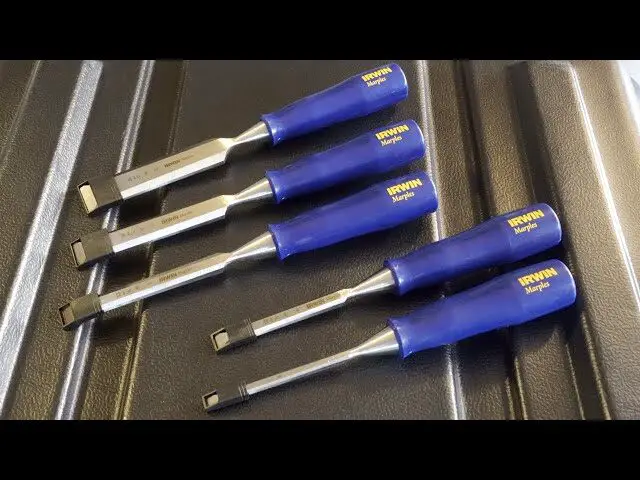
While not a premium set, the Irwin Marples chisels are reliable workhorses we often use for on-site jobs or rough carpentry.
During our structural framing tests and utility build-outs, these chisels withstood heavy mallet blows and even the occasional nail strike without major damage.
The high-carbon steel edges do dull faster than higher-end sets, but they also sharpen quickly.
The handles are resin-molded with steel striking caps, making them ideal for rugged environments where finesse isn’t the priority.
We compared this set to cheaper hardware store brands, and the Irwins were significantly more consistent in edge geometry and steel quality.
Ideal For: DIYers, site work, and job-site roughing where durability is key.
Notable Feature: Reinforced handles with steel caps for repeated hammer impact.
7. WoodRiver Bevel Edge Socket Chisels – Best Lie-Nielsen Alternative
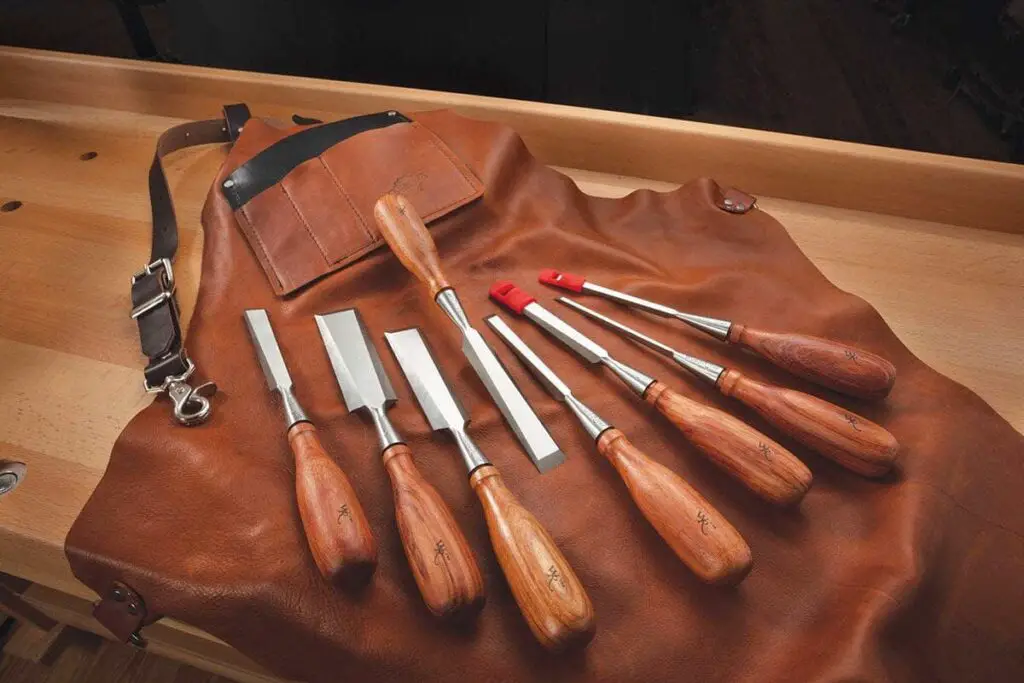
WoodRiver’s socket chisels offer performance comparable to Lie-Nielsen but at a more accessible price.
This set uses CR-V steel, hardened to about RC 60–62, and performed well during detailed joinery in hardwoods like cherry and hard maple.
The classic socket design allows for easy handle replacement, and the hornbeam handles are shaped for a traditional grip that suits both paring and chopping.
In our mortise and dovetail tests, these chisels felt well-balanced and accurate, with bevel edges thin enough for tight corner access.
The 2025 version has improved steel tempering over earlier models, leading to better edge retention — a clear upgrade from the version we tested in 2023.
Ideal For: Woodworkers wanting traditional socket chisels without the premium price tag.
Notable Feature: Excellent grind geometry and improved heat treatment for 2025.
How We Test Chisel Sets
Each chisel set was tested through a 5-point methodology:
- Edge Durability: We chopped and pared through oak, maple, and soft pine, recording when sharpening was required.
- Sharpening Test: Time taken to reach a mirror edge from factory condition was logged for each chisel.
- Handle Ergonomics: We used each set during 3-hour sessions to identify hand fatigue or discomfort.
- Bevel Accuracy & Grind Quality: Checked for factory bevel precision and flatness of the back using machinist straightedges.
- Real Joinery Use: Built sample dovetail joints, mortises, and tenons using each set under identical conditions.
Out of 19 sets, 12 were eliminated due to chipping, poor grind quality, or subpar performance. We continually re-evaluate this list as newer models arrive — three chisels on this list were added in 2025 due to performance improvements and updated materials.
Final Thoughts
A good chisel set is more than just sharp steel — it’s about consistency, control, and confidence in every cut. Whether you’re a beginner looking for value or a professional demanding edge longevity, there’s a chisel set here that matches your needs.
At WoodworkingToolsHQ.com, we base our recommendations on direct experience — no affiliate fluff, no press release hype, just honest testing and real-world results.
If you have a specific project or material in mind, feel free to reach out — we’re always working on the next round of reviews.
Expert Advice: How to Choose the Right Woodworking Chisel Set (Beginner’s Full Guide)
From the Testing Team at WoodworkingToolsHQ.com
Choosing the right woodworking chisel set isn’t just about picking a brand that looks good online — it’s about understanding the material, build, shape, steel quality, usability, and long-term maintenance of the tools you’ll be working with for years.
If you’re just starting out, this guide walks you through every decision point clearly and thoroughly, based on real workshop experience and hands-on testing.
Start with the Basics: Know What a Woodworking Chisel Actually Does
A woodworking chisel is a tool designed to remove wood in controlled ways — by slicing, chopping, paring, or shaving. It consists of two main parts: a metal blade with a sharpened edge and a handle for grip and striking.
You’ll use chisels for tasks like cleaning out joints, fine trimming, making mortises and tenons, or carving decorative details. Different chisel shapes and sizes suit different tasks, so understanding the purpose is the first step in choosing wisely.
Understand the Types of Chisels — One Set Doesn’t Do Everything
There are several common types of chisels:
- Bevel-edge chisels have slanted sides, making them ideal for dovetail work and tight joinery. These are the most versatile and best for general woodworking.
- Firmer chisels have straight sides and are thicker, used for rougher work where precision is not as critical.
- Mortise chisels are thick and reinforced for heavy chopping into wood fibers to create mortises.
- Paring chisels are long, thin, and designed for delicate slicing or trimming across grain.
Advice: If you’re just starting out, a set of bevel-edge bench chisels (4 to 6 sizes) is the best place to begin because it covers most joinery and shaping tasks in furniture and cabinet work.
Know the Steel Type — This Affects How Long the Chisel Stays Sharp
The type of steel used in the blade determines how sharp your chisel can get, how long it stays sharp, and how often it needs maintenance. You’ll find three main types of steel:
- High-carbon steel is common in entry-level chisels. It’s easy to sharpen but dulls quickly and needs frequent honing.
- O1 tool steel is a step up and holds a better edge while still being easy to sharpen.
- A2 steel is harder and holds an edge longer but is a bit more difficult to sharpen.
- PM-V11 and other powdered metals are advanced steels with extremely high edge retention and wear resistance.
Advice: If you’re a beginner, choose a set made from O1 steel or high-carbon steel so you can learn sharpening more easily. Avoid exotic steels unless you have proper sharpening stones and experience.
Always Check the Rockwell Hardness Rating — It Tells You Edge Strength
Steel hardness is measured on the Rockwell “C” scale (HRC). Most quality woodworking chisels fall between RC 58–62.
- A rating around RC 60 is ideal — it stays sharp without being brittle.
- Steels above RC 62 can chip under impact, especially if the bevel is thin.
- Ratings below RC 58 will dull quickly and feel soft when chopping.
Advice: Choose chisels in the RC 59–61 range for a reliable balance of sharpness and durability, especially when working with hardwoods like oak or maple.
Look at the Factory Finish — A Flat Back Saves You Hours of Work
To function properly, a chisel’s back must be perfectly flat, because it guides your cut and determines how smoothly you can pare a surface.
If the back has deep machine marks, waves, or hollows, you’ll need to spend a lot of time flattening it with sharpening stones or sandpaper on glass.
Advice: Pick chisels that are advertised as “ready to use” or come with a polished or pre-flattened back. We’ve tested some that took 2+ hours to properly flatten — avoid those as a beginner.
Choose the Right Bevel Angle — It Affects Cutting Performance
Most bench chisels come with a 25° primary bevel, which is ideal for chopping and general joinery. You can add a 30° micro-bevel during sharpening to increase edge life.
Some chisels for softwood work come with lower angles (20°–22°), while mortise chisels may have a steeper bevel (35°) to handle deeper impact.
Advice: Stick to 25° bevel-edge chisels as a beginner. They work well for nearly all tasks and sharpen easily with standard tools.
Consider the Handle — Comfort and Impact Resistance Matter
Chisel handles come in various materials:
- Wood handles (like hornbeam or ash) feel natural and absorb shock well. They’re best for pairing with wooden mallets.
- Plastic or polypropylene handles are more impact-resistant and often come with steel caps for use with a hammer.
- Socket vs. tang handles: Socket handles are more durable and easier to replace. Tang handles are fine for lighter work but may split under heavy use.
Advice: For general woodworking, a wooden handle or capped plastic handle is ideal. Avoid extremely lightweight or cheaply glued handles that might break under pressure.
Think About Balance and Weight — You Should Feel in Control, Not Fatigued
A well-balanced chisel gives you more control in fine work, especially when slicing or paring along delicate lines. If the chisel is too blade-heavy, you’ll struggle to maintain precision.
If it’s too light, you’ll exert more force than needed, which can cause wrist strain over time.
Advice: Look for a set that feels comfortable and neutral in the hand. Ideally, try holding one before buying, or read reviews where the balance is clearly described from real users or testers.
Know Which Sizes to Start With — Don’t Overbuy or Undershoot
Most chisel sets range from 3-piece to 8-piece kits. The most useful sizes for beginners are:
- 6mm (1/4″)
- 12mm (1/2″)
- 18mm (3/4″)
- 25mm (1″)
These cover most mortises, dovetails, edge trimming, and general paring work.
Advice: Start with a 4-piece set covering 6mm to 25mm. You can always add specialty sizes later as your projects grow in complexity.
Don’t Overlook the Sharpening Process — It’s Part of Owning Chisels
Every chisel, no matter how expensive, will need sharpening sooner or later. Some steels (like A2 and PM-V11) take longer to sharpen and need diamond or ceramic stones. Others (like O1 and high-carbon steel) can be maintained with simple water stones or sandpaper.
Advice: Choose a chisel that matches your sharpening setup. If you’re new to sharpening, go for a steel type that’s known to be beginner-friendly — and invest in at least one flat stone to keep your tools in shape.
Storage Is More Important Than You Think — Protect the Edge
A razor-sharp chisel edge is delicate and can dull or chip easily if it bumps into another tool or the bottom of a toolbox. Good chisel sets come with wooden boxes, canvas rolls, or blade caps.
Advice: If a set doesn’t include blade guards or storage, buy them separately. A small investment in protection saves hours of re-sharpening later.
Be Skeptical of “Too Cheap to Be True” Sets — They Often Waste Your Time
We’ve tested many sub-$30 chisel sets, and nearly all of them suffered from warped blades, weak steel, or loose handles.
Some looked decent out of the box but chipped during first use or required several hours of flattening before they could be used.
Advice: Set a realistic budget. A quality beginner set costs around $50–$100, and that investment will save you both frustration and time.
Don’t Buy Based on Brand Alone — Judge Based on Testing and Material Details
Some lesser-known brands offer excellent quality, while some famous ones sell budget lines that aren’t worth the price.
The key is to look beyond the logo and examine the steel type, factory finish, and handle construction.
Advice: Read detailed reviews that mention actual use — not just star ratings.
Find out if the chisels were tested in hardwoods, how long they held their edge, and whether they arrived truly flat.
Final Word: Buy a Chisel Set That Matches Your Woodworking Path
Not every woodworker needs a $300 chisel set — and not every budget set is good enough to grow with.
Choose Chisel based on what type of woodworking you want to do: furniture building, cabinetry, fine joinery, or basic repair. Think long-term.
A good chisel set will last decades if you take care of it — and your first set should help you learn, not limit you.
If you’re still unsure, you’re welcome to reach out to our team.
We test every set we review, and we’re happy to help recommend something that fits your skill level, tools, and budget.

